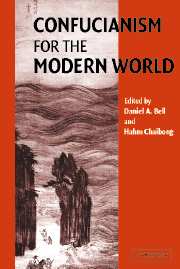Crossref Citations
This Book has been
cited by the following publications. This list is generated based on data provided by Crossref.
2001.
The Liberal Project and Human Rights.
p.
365.
Holliday, Ian
2002.
Building e‐government in East and Southeast Asia: Regional rhetoric and national (in)action.
Public Administration and Development,
Vol. 22,
Issue. 4,
p.
323.
Shin, Gi‐Wook
2005.
Asianism in Korea’s politics of identity.
Inter-Asia Cultural Studies,
Vol. 6,
Issue. 4,
p.
616.
Kelly, Paul
2006.
The Social Theory of Anti‐Liberalism.
Critical Review of International Social and Political Philosophy,
Vol. 9,
Issue. 2,
p.
137.
Xu, Keqian
2006.
Early Confucian Principles: the Potential Theoretic Foundation of Democracy in Modern China.
Asian Philosophy,
Vol. 16,
Issue. 2,
p.
135.
Turner, Bryan S.
2007.
Rule of Virtue: China and Human Rights.
Journal of Human Rights,
Vol. 6,
Issue. 2,
p.
265.
FAN, RUIPING
2008.
Toward a Directed Benevolent Market Polity: Rethinking Medical Morality in Transitional China.
Cambridge Quarterly of Healthcare Ethics,
Vol. 17,
Issue. 3,
p.
280.
Kim, Terri
2009.
International Handbook of Comparative Education.
p.
857.
Hwang, Kwang-Kuo
and
Chang, Jeffrey
2009.
Self-Cultivation.
The Counseling Psychologist,
Vol. 37,
Issue. 7,
p.
1010.
Jung, Jaehee
and
Lee, Yoon-Jung
2009.
Cross-Cultural Examination of Women’s Fashion and Beauty Magazine Advertisements in the United States and South Korea.
Clothing and Textiles Research Journal,
Vol. 27,
Issue. 4,
p.
274.
Kim, Sungmoon
2010.
On Korean dual civil society: Thinking through Tocqueville and Confucius.
Contemporary Political Theory,
Vol. 9,
Issue. 4,
p.
434.
Elstein, David
2010.
Why Early Confucianism Cannot Generate Democracy.
Dao,
Vol. 9,
Issue. 4,
p.
427.
Chai, Sun-Ki
and
Rhee, Mooweon
2010.
Confucian Capitalism and the Paradox of Closure and Structural Holes in East Asian Firms.
Management and Organization Review,
Vol. 6,
Issue. 1,
p.
5.
Varutti, Marzia
2010.
Using Different Pasts in a Similar Way: Museum Representations of National History in Norway and China.
Culture Unbound,
Vol. 2,
Issue. 5,
p.
745.
2010.
The Intellectual Foundations of Chinese Modernity.
p.
61.
Kim, Sungmoon
2010.
The Secret of ConfucianWuweiStatecraft: Mencius's Political Theory of Responsibility.
Asian Philosophy,
Vol. 20,
Issue. 1,
p.
27.
Wong, Meiling
2010.
Guanxi Management in Lean Production System—An Empirical Study of Taiwan‐Japanese Firms.
The American Journal of Economics and Sociology,
Vol. 69,
Issue. 3,
p.
1079.
He, Baogang
and
Warren, Mark E.
2011.
Authoritarian Deliberation: The Deliberative Turn in Chinese Political Development.
Perspectives on Politics,
Vol. 9,
Issue. 2,
p.
269.
Lew, Seok-Choon
Choi, Woo-Young
and
Wang, Hye Suk
2011.
Confucian Ethics and the Spirit of Capitalism in Korea: The Significance of Filial Piety.
Journal of East Asian Studies,
Vol. 11,
Issue. 2,
p.
171.
Tsai, Terence
Young, Michael N.
and
Cheng, Bor-shiuan
2011.
Confucian business practices and firm competitiveness: The case of Sinyi Real Estate.
Frontiers of Business Research in China,
Vol. 5,
Issue. 3,



